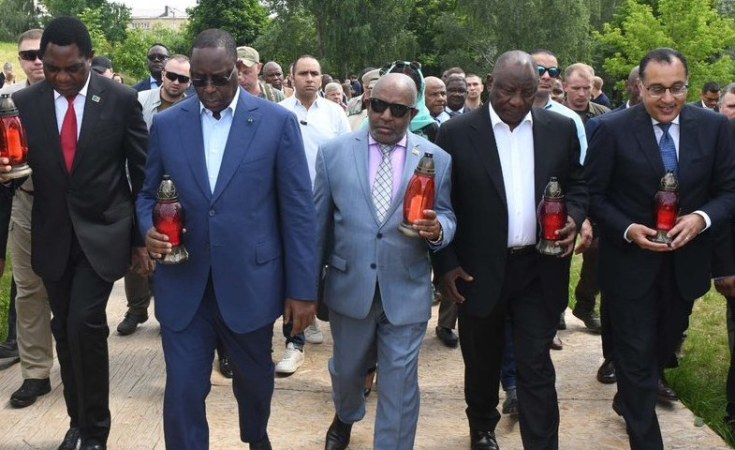A delegation of African leaders met President Volodymyr Zelensky on Friday and told Russia and Ukraine to de-escalate and negotiate, hours after sheltering from missile strikes on Kyiv.
The high-level diplomatic team came to the Ukrainian capital to voice the concerns of a continent that has suffered from the fallout of the war, including rising grain prices, calling their visit a "historic mission".
Shortly after their arrival, air raid sirens sounded across the country, as Russian missiles were detected.
After talks with Zelensky, South African President Cyril Ramaphosa said the missile barrage showed that both sides needed to stop fighting.
"This war must be settled and there should be peace through negotiations," he told a news conference.
"The launching of the missiles today does not deter us and has not stopped us from continuing to call for de-escalation," he added.
"It is precisely that type of event that we saw today... that makes us call for de-escalation," Ramaphosa said, quoting Nelson Mandela several times on the need for peace.
Zelensky rejected any negotiations with Moscow, saying he had made clear to the African leaders that "permitting any talks with Russia now, when the occupier is on our land, means freezing the war, freezing pain and suffering".
He said in a statement he had called on the leaders to set out their views on how to stop the "crimes committed by Russia" and how to work towards food security.
"But first of all, we must restore the full force of the UN Charter and stop this brutal Russian aggression and free our land," he added.
The African delegation had gone first to Bucha, a town outside the capital that has become synonymous with alleged war crimes carried out by Moscow.
The delegation included four presidents: Ramaphosa, Senegal's Macky Sall and Zambia's Hakainde Hichilema, plus Comoros' Azali Assoumani, who heads the African Union.
The leaders of Uganda, Egypt and Congo-Brazzaville pulled out of the visit at the last moment and sent representatives instead.
The talks came as Ukraine announced gains in its new offensive, but Russian President Vladimir Putin renewed his claim that Kyiv's forces "stand no chance" in the sectors where fighting has intensified.
- 'Clear message' -
Ramaphosa's spokesman Vincent Magwenya said the South African president went down into a shelter "as a precaution" when air raid sirens sounded in Kyiv.
Following the attack, the Ukrainian Air Force said it had shot down 12 missiles including six hypersonic Kinzhal missiles.
There was no reported damage inside the city, but seven people including two children were wounded, the regional police said.
"With what happened today, it's very obvious also to the African leaders how sincere Putin is about stopping the conflict," said Peter Stano, a spokesman for EU foreign policy chief Josep Borrell.
The African leaders were to travel on to the northwestern Russian city of Saint Petersburg and meet Putin on Saturday.
"In our view it is important to listen very carefully to what both countries have to say and tomorrow we are now going to listen to President Putin," Ramaphosa said.
Ukrainian officials were quick to highlight that Russia did not cease strikes during the high-profile visit.
"Russian missiles are a message to Africa: Russia wants more war, not peace," Foreign Minister Dmytro Kuleba said.
France also condemned the bombardment, a foreign ministry statement saying they constituted "war crimes and cannot rest unpunished".
Ramaphosa dodged a question about whether South Africa would arrest Putin if he attended a BRICS summit there in August, after the International Criminal Court issued an arrest warrant for the Russian president.
South Africa could hand over hosting the summit to another country to avoid being obliged to arrest Putin.
"We are discussing this matter on a continuous basis... In the end I am the one who makes the announcement about how this BRICS summit is going to be held," Ramaphosa said.
He also said he would hold a separate bilateral with Putin to discuss the summit.
- 'Touching livelihoods' -
Analysts said the mediating effort could hope to win some concessions from the Kremlin ahead of a Russia-Africa summit next month.
The African continent has been badly hit by rising grain and fertiliser prices and the wider impact on global trade since Russia invaded Ukraine last year.
"This conflict is also affecting African countries negatively, touching on the livelihoods of 1.2 or 1.3 billion people on the African continent," Ramaphosa said.
African nations have been divided over their response to the war, with some siding with Ukraine, while others have remained neutral or gravitated towards Moscow.
South Africa has drawn scrutiny as it has refused to condemn the offensive launched by Moscow.
Both Russia and Ukraine have stepped up diplomatic initiatives with African countries divided over their response to the war.
Putin has portrayed Moscow as a bulwark against the West, which he also accuses of blocking Russian exports of fertilisers.
Kremlin spokesman Dmitry Peskov said Friday that Russia has seen "very dynamic development recently of our relations with African states".
The African delegation arrived in Ukraine by train after flying to Poland, where some members of Ramaphosa's security team were not allowed to disembark and accused Polish authorities of racism.
Warsaw said some of those on board did not have permission to carry weapons into the country and were thus not allowed off the plane.


